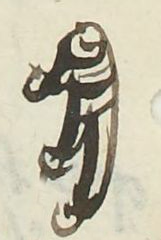Apanecatl (MH486v)
This is a black-line drawing of the simplex glyph for the personal name Apanecatl, which was short for Atempanecatl or Atecpanecatl, according to Susan Gillespie, The Aztec Kings, 1989, 258. According to the Crónica Mexicayotl, Apanecatl was a legendary teomama (bearer of a divine force) in the migration that eventually reached and founded Mexico City. The name includes "Apan" (from apantli, canal or waterway), suggesting a reading of "Canal Person." The glyph shows a three-part stream of water falling downward. Thick black lines suggest currents. The tips of the streams have droplets or beads. The water swirls slightly at the top.
Stephanie Wood
The name Apanecatl is still very much in use today in Mexico in the Sierra de Zongolica, Estado de Veracruz. See: Ezequiel Jiménez Romero, Santos Carvajal García, Ramon Tepole González, and Jorge Luis Hernández, "Apellidos Nahuas Vigentes," published to Facebook by Ernestina Lara Cuevas, 30 May 2020. A Google search brings up many examples.
Stephanie Wood
andres apanecatl
Andrés Apanecatl
Stephanie Wood
1560
nombres de hombres

Apanecatl, a name of an important historical figure, https://nahuatl.wired-humanities.org/content/apanecatl
apantli, waterway, https://nahuatl.wired-humanities.org/content/apantli
-e, possessive suffix, https://nahuatl.wired-humanities.org/content/a
-catl, a suffix that indicates affiliation or ethnicity, https://nahuatl.wired-humanities.org/content/catl
Matrícula de Huexotzinco, folio 486v, World Digital Library, https://www.loc.gov/resource/gdcwdl.wdl_15282/?sp=52&st=image.
This manuscript is hosted by the Library of Congress and the World Digital Library; used here with the Creative Commons, “Attribution-NonCommercial-ShareAlike 3.0 License” (CC-BY-NC-SAq 3.0).


